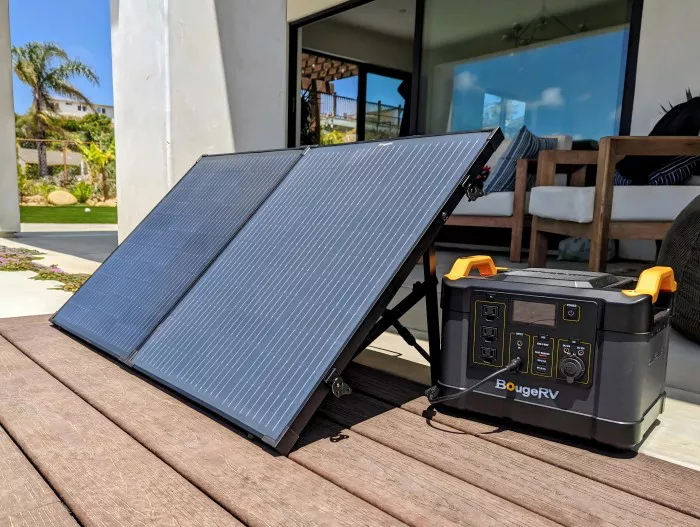Solar energy is becoming increasingly popular as a sustainable and cost-effective solution for powering homes. With advancements in technology, solar generators are now more efficient and powerful than ever before. But can a solar generator power an entire house? The answer is yes, and this article will explore the possibilities, the best options available, and what to consider when choosing a solar generator for home use.
1. Understanding Solar Generators
Solar generators consist of solar panels, a battery storage system, and an inverter. The solar panels capture sunlight and convert it into electricity, which is then stored in the battery. The inverter converts the stored DC (direct current) power into AC (alternating current) power, which is used by most home appliances.
1.1 Key Components of a Solar Generator
Solar panels: Capture sunlight and convert it into electricity
Battery storage: Stores the captured energy for later use
Inverter: Converts DC power from the batteries into AC power for home use
2. Can a Solar Generator Power a Whole House?
Yes, a solar generator can power a whole house, but it depends on several factors such as the size of the generator, the energy needs of the house, and the amount of sunlight available. Here are the main considerations:
2.1 Energy Needs Assessment
Before choosing a solar generator, it’s essential to assess the energy needs of your home. Calculate the total wattage required by summing up the wattage of all appliances you intend to power. Consider essential appliances like refrigerators, air conditioners, lights, and other electronics.
2.2 Battery Capacity
The battery capacity of the solar generator determines how much energy can be stored and used. Higher capacity batteries are necessary for powering a whole house, especially during times when sunlight is not available.
2.3 Solar Panel Efficiency
The efficiency of the solar panels affects how much sunlight is converted into electricity. High-efficiency panels are more effective in capturing sunlight and generating power.
3. Top Solar Generators Capable of Powering a House
Several solar generators on the market are designed to power a whole house. Here are some of the top-rated options:
3.1 EcoFlow Delta Pro
The EcoFlow Delta Pro is one of the most powerful solar generators available, designed to handle the energy needs of a large home.
3.1.1 Features
The Delta Pro offers a robust battery capacity of 3,600Wh and a power output of 3,600W, with a surge capacity of 7,200W. It includes multiple AC outlets, USB ports, and DC carports. The solar input capability is up to 800W, enabling rapid recharging. With a weight of 99 lbs, it is built for durability and heavy-duty use.
3.1.2 Advantages
The Delta Pro’s substantial battery capacity and high surge power make it suitable for running large appliances and multiple devices simultaneously. Its efficient solar input ensures quick recharging, making it an excellent choice for both home backup and off-grid applications.
3.2 Bluetti EP500
The Bluetti EP500 is another robust solar generator designed to power a home with ease.
3.2.1 Features
The EP500 features a massive battery capacity of 5,100Wh and a power output of 2,000W, with a surge capacity of 4,800W. It includes various AC outlets, USB ports, and DC carports. The solar input capability is up to 1,200W. Weighing 167.5 lbs, it offers substantial power while remaining portable.
3.2.2 Advantages
The EP500’s large battery capacity and power output can handle heavy-duty appliances and multiple devices. Its high solar input capability ensures efficient recharging, making it a practical choice for residential power needs.
3.3 Goal Zero Yeti 6000X
The Goal Zero Yeti 6000X is designed for heavy-duty use, making it an excellent option for home power.
3.3.1 Features
The Yeti 6000X offers a substantial battery capacity of 6,071Wh and a power output of 2,000W, with a surge capacity of 3,500W. It includes various AC outlets, USB ports, and DC carports. The solar input capability is up to 600W. With a weight of 106 lbs, it is built for durability and reliability.
3.3.2 Advantages
The Yeti 6000X’s high battery capacity and power output make it ideal for running a variety of household appliances. Its durable construction and efficient solar input provide a reliable and sustainable power solution.
see also: Best Solar Generator for Rv Camping
4. Factors to Consider When Choosing a Solar Generator
4.1 Power Output
Ensure the generator can provide enough continuous and surge power for your household needs. Match the power output with the combined wattage of your essential appliances.
4.2 Battery Capacity
Higher battery capacity allows for longer use without recharging. Consider your energy consumption patterns and choose a generator with sufficient capacity to meet your needs.
4.3 Solar Input
Efficient solar input ensures quicker recharging times. Look for generators with high solar input capabilities to maximize energy generation during the day.
4.4 Portability
While portability might be less of a concern for home use, it’s still worth considering if you plan to move the generator or use it for outdoor activities as well.
4.5 Price
Solar generators can be a significant investment. Compare the features, capacity, and price to find the best value for your needs.
Conclusion
The EcoFlow Delta Pro, Bluetti EP500, and Goal Zero Yeti 6000X are among the top-rated options capable of handling residential power needs. When choosing a solar generator, consider factors such as power output, battery capacity, solar input efficiency, and your specific energy requirements. With the right solar generator, you can enjoy a reliable and eco-friendly power solution for your home, reducing dependence on traditional energy sources and contributing to a more sustainable future.
Related topics:
- Can Solar Panels Run a Generator
- Best Solar Generator for Rv Camping
- Unlocking the Power of the Sun: The Ultimate Guide to Solar Generators

